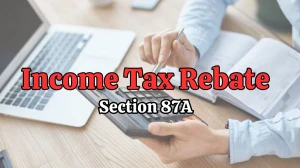
Why Do Property Taxes Go Up? Where Do Property Taxes Go? Are Property Taxes Deductible?
Property taxes rise from changing rates, property values, and local spending. They fund counties, districts, cities, and schools, and can be partially deductible if itemized. Deductions have limits and exclude specific fees.
by Sangamithra
Published Aug 31, 2023 | Updated Aug 31, 2023 | 📖 6 min read
Why Do Property Taxes Go Up?
Property taxes often experience increases due to a confluence of factors. Shifts in property tax rates can be attributed to variables such as the degree of reliance on property taxes by communities, fluctuations in property values within cities, shifts in local government spending patterns, and differing property classifications.
State-level regulations and relief programs for specific groups, such as elderly or disabled residents, also contribute to the complexity. These multifaceted considerations make direct comparisons challenging, as adjustments to these variables can lead to varying outcomes in tax calculations. As a result, property tax bills can experience fluctuations even within cities with similar effective tax rates, driven by the interplay of these intricate factors.
Where Do Property Taxes Go?
Property taxes are allocated in a specific manner within the county, distributing the basic 1% property tax among various entities. Approximately 13% goes to the county itself, while special districts receive 20%, cities obtain 8%, and schools secure the largest share at 48%. Additionally, a portion of 11% is allocated to the dissolution of redevelopment projects.
The Tax Rate Area Allocation system further breaks down these allocations, allowing property owners to understand how taxes are divided into their specific regions. This distribution model was established based on Proposition 13 enabling legislation, ensuring that local jurisdictions receive a predetermined portion of the post-Proposition 13 tax base and its growth annually.
The allocation framework also accounts for properties within redevelopment project areas, which have their own distinctive tax distribution approach. Overall, this information provides a comprehensive insight into the intricate process of where property tax dollars are directed within the county.
Are Property Taxes Deductible?
Property taxes can be deductible if you itemize your deductions on Schedule A of Form 1040. Both personal property taxes and real property taxes, including those paid on your main residence and other real estate you own, are eligible for deduction. However, there are limits to the total deductible state and local income taxes, including property taxes, which are capped at $10,000 per year starting from 2018.
While maintenance and repair costs itemized by the tax authority can be deductible, certain charges on your property tax bill, such as service fees and fines, are non-deductible. If you pay property taxes through an escrow account, only the amount paid by your bank or lender is deductible.
Do You Pay Property Taxes Monthly or Yearly?
Property taxes can be a significant financial consideration for homeowners. These taxes fund vital local services like schools and public safety. Understanding their payment frequency is crucial. In most areas, property taxes are paid either annually or semiannually.
Homeowners pay taxes based on their property's assessed value and the prevailing tax rates. Some opt to include property taxes in their mortgage payment through an escrow account, ensuring consistent, monthly contributions. Skipping property tax payments can lead to mortgage liens or foreclosure. So, whether you pay monthly through escrow or yearly directly, staying current on property taxes is paramount for homeowners.
What Are Property Taxes?
Property taxes are levied on real estate properties owned by individuals or legal entities like corporations. These taxes are calculated by local governments based on the value of the property, including both the land and structures.
The tax amount is determined by multiplying the property tax rate by the current market value of the property. These funds are used by the local government to support essential services like water and sewer improvements, law enforcement, fire protection, education, and infrastructure development.
Property tax rates and assessment methods can vary widely based on the jurisdiction. It's important to note that property tax is different from real estate tax, as it encompasses both real property (land, structures) and tangible personal property (such as cars or boats).
When Are Property Taxes Due?
Property taxes in Illinois are typically paid in two installments, with due dates varying by county. Most counties follow a schedule where the first installment is due on June 1 and the second on September 1. If tax bills are sent out after May 1, the first installment becomes due 30 days after the bill's date.
Cook County and some others have an accelerated billing method: the first installment, 55% of the previous year's bill, is mailed by January 31 and due by March 1 in Cook County.
The second installment, covering the remaining tax balance, is sent around June 30, with a due date of August 1 or as specified by the county. It's important to check with your county treasurer's office for specific due dates, either through local phone listings or online resources.
How Do I Look Up My Property Taxes?
In order to retrieve information about their property taxes, individuals can follow these steps:
Form 1098 from the Mortgage Company:
Individuals should locate and check box 10 (Other) on Form 1098, which is provided by their mortgage company. This form typically includes details about the property taxes paid.
Reviewing Bank or Credit Card Records:
If the individual has made property or real estate tax payments directly, they should review their bank or credit card records. This review will help them identify transactions corresponding to their property tax payments.
Visiting the City or County Tax Assessor's Website:
By visiting the official website of the local city or county tax assessor's office, individuals can look for specific links such as "Property Search" or "Property Tax Records." These online resources should provide comprehensive information regarding their property tax payments.
Do Nonprofits Pay Property Taxes?
Nonprofit organizations, operating under IRS tax code subsection 501(c), are exempt from federal income taxes. However, their exemption extends beyond income taxes. Nonprofits are also typically exempt from paying property taxes, a financial advantage that stems from their dedication to charitable, scientific, religious, or public safety purposes.
This exemption allows nonprofits, including private foundations and churches, to allocate resources more efficiently toward their missions. Nonetheless, it's important to note that if a nonprofit engages in activities unrelated to its core purpose, it might be liable for property taxes on those specific activities.
This dual nature of exemption and liability underscores the unique financial considerations that come with being a tax-exempt organization committed to societal betterment.
Do Cemeteries Pay Property Taxes?
Cemeteries often receive property tax exemptions due to their solemn nature and public service role. In many jurisdictions, including California, cemeteries can qualify for property tax relief if they meet certain criteria. These criteria usually involve being used exclusively for burial purposes and adhering to zoning laws. Pioneer cemeteries, those predating 1900 and no longer actively used, might also qualify for exemptions.
To avail of the exemption, cemetery owners usually need to file an annual claim with the local assessor's office within specified timeframes. Failure to file on time might result in reduced relief. This exemption acknowledges the unique nature of cemeteries as spaces of memorialization, protecting them from typical property tax obligations.
Why Do Property Taxes Go Up - FAQs
1. Why do property taxes increase?
Property taxes can increase due to shifts in property values, local government spending, changing tax rates, and eligibility for exemptions.
2. Where do property taxes go?
Property taxes are allocated to counties, schools, cities, and special districts, with schools receiving the largest share.
3. Can property taxes be deducted?
Property taxes are deductible if itemized on Form 1040, but the total deduction for state and local taxes is capped at $10,000.
4. How often are property taxes paid?
Property taxes are usually paid annually or semiannually, with some homeowners opting for monthly payments through escrow.
5. Why do cemeteries get property tax exemptions?
Cemeteries receive exemptions due to their unique purpose as memorial spaces, following specific criteria like exclusive burial use and adhering to zoning laws.




